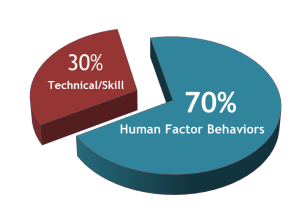
The Emphasis on Skills in Recruitment
Recruiters typically get very excited when an applicant comes into the process with lots of experience and the skills required to do the job. Or with less job experience but who nevertheless scored well on some skills test. Skills experience is good; skills testing is good. If we are going to have an electrician wire a 220 box, we need to know that they know how to do that. If we hire a motor coach operator, we must verify they have a CDL (skills knowledge test plus behind-the-wheel training).
Beyond Skills: Understanding the Importance of Job Behaviors
Here’s the rub. Even the most technical job, like electrician, is only about 30% technical, and even if you had a perfect measure of that 30%, you would still only be measuring about 30% of the job. It is very, very difficult to predict overall job performance based on 30% of the job. Any given job is at least 70 to 80% human factor behaviors (referred to by some as soft skills), which also make up the job and will significantly impact job performance. And unless one considers these when hiring, mediocre job performance, regardless of skill level, is almost guaranteed. A licensed (skilled)electrician who does not have “thinks through the job before starting” as a part of his behavioral approach to the job (human factor behavior) will spend way too much time walking back and forth to his truck to get tools and there goes productivity.
A Shift in Focus: Hiring for Behaviors, Training for Skills
I once was asked to speak to a group of H.R. professionals in the refinery industry. Their companies supplied skilled labor to big oil refineries and plants along the Gulf Coast, and they were constantly pressured to “prove up” the skill levels of the people they were placing in these plants. It was all about “skills” for them. Remember, I, too, believe that proving skills is essential, but I was trying to get them to understand the importance of the “other” 70% of the job. They were a tough group. Finally, I asked them to tell me the last time that any of them had fired someone because they didn’t know what they were doing technically. In a room of thirty, not a single hand went up. Not that it doesn’t happen, but the thing most people get fired for comes from the 70%, not the 30%.



